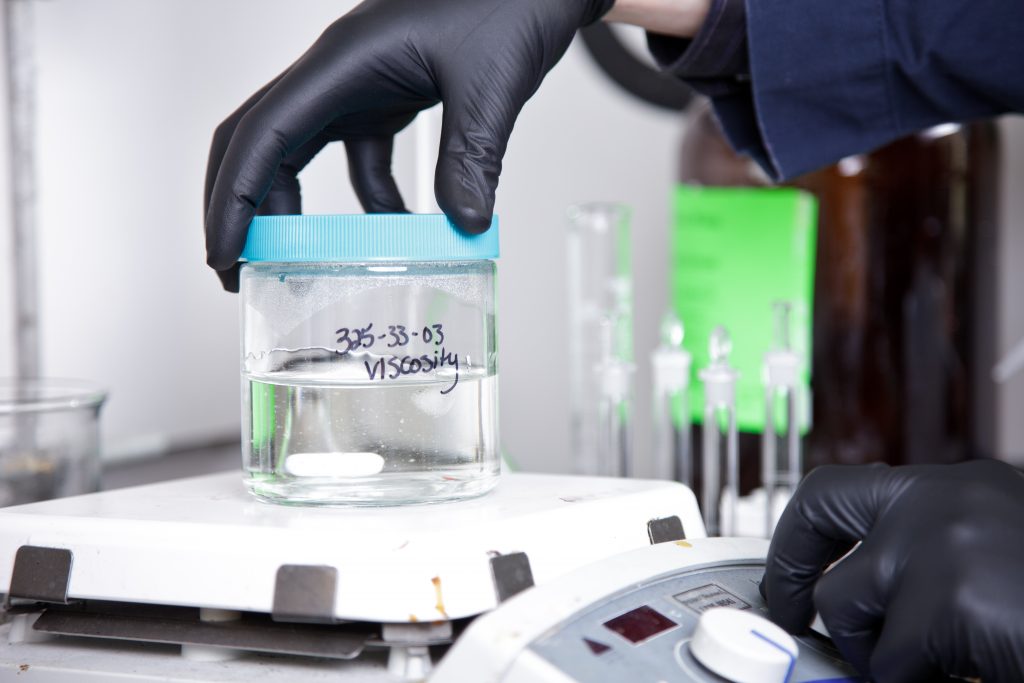Dilute Solution Viscometry (DSV) is a testing method used to determine the relative, inherent, or intrinsic viscosity of a polymer. Viscosity increases or decreases as molecular weight increases or decreases. While DSV doesn’t provide an exact measurement of weight, changes in viscosity help scientists determine whether or not a polymer’s molecular weight has changed as a result of any number of factors: degradation, manufacturing error, or sterilization, for example.
“We use DSV to get a sense of the average molecular weight of a sample in a quick and cost-effective manner,” explained Laboratory Manager, Dr. Alan Sentman. “We choose DSV testing for well-known systems where we may need very fast turnaround of fairly large numbers of samples.”
DSV testing is a relatively straightforward process. The polymer is weighed, then dissolved in the appropriate solvent to create a solution. We place a fixed volume of solution and a viscometer in a constant temperature water bath, and then bring the solution up through a capillary viscometer. We measure the flow time of the solution: how long it takes the solution to flow through the viscometer. Then, we measure the flow time of an equal volume of pure solvent. The difference in values of the two flow times give us a sense of the polymer’s viscosity; by running this test on multiple polymers, we can determine if there are changes in the polymer’s molecular weight among the samples. “It’s not quite linear or exactly proportional, but in all cases where you run two portions of similar materials under the same conditions, higher DSV value indicates higher molecular weight,” Sentman said.
Why would we use a testing method that doesn’t provide exact molecular weight results? “If detailed statistical analysis of molecular weight is desired, then we would choose size-exclusion chromatography over DSV,” Sentman said. “However, that technique is longer to run, more expensive, and less comparable to values obtained in other labs.” The goal of any scientific endeavour is that the results be reliable and reproducible. Thus, a test that provides reproducible and reliable results across laboratories is often the best test.
DSV tests have multiple uses. One of our common uses is for comparisons: comparing a polymer’s previous viscosity to its current, or comparing the viscosities of the same two, yet differently-performing, polymers. “This test is commonly used in production environments where the raw polymer has a specification DSV value, and at each step of the process (molding, machining, sterilization, etc) the value can be measured again and compared to the previous values,” Sentman said.
Other common uses include:
- Production lot release testing, where the DSV value of the product should be the same every time. Test results are compared to a specification range to show that each material batch was manufactured correctly.
- Various altered state studies, such as sterilization, shelf life, aging, and degradation studies. DSV value is used to determine how significantly the polymer resists (or is degraded by) specific conditions, according to an increase or decrease in its viscosity and thus its molecular weight.
- Material comparison studies. Two batches of material may be performing differently in use, and we’re testing to distinguish the ways in which the materials may differ.
DSV testing can be used for any polymer which dissolves in some solvent without chemical reaction or degradation. Medical polyester materials like PLA, PGA, and copolymers, for example, as well as nylons and industrial polyesters like PET are all common DSV testing materials. At SGS PSI, we can run polyolefins as well– like polyethylene and polypropylene–at high temperatures, which is uncommon for most labs. We’re also one of the few labs that handles the organic compound hexafluoroisopropanol, useful for some nylons and highly crystalline ester polymers.
If you believe a DSV test may be useful in distinguishing alterations to your material, manufacturing errors, or other similar needs, contact us today to learn more about our testing capabilities.

